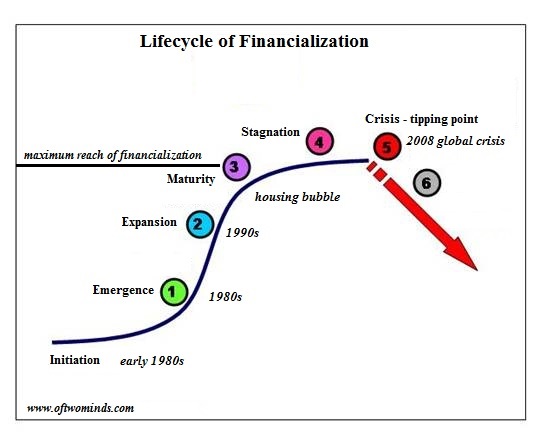Credentials are increasingly in over-supply; problem-solving skills are scarce.
How do we create value in an economy that is increasingly dependent on knowledge? The answer is complicated by the reality that knowledge is increasingly digital and "unownable" and therefore almost free.
Financialization as a substitute for creating value has run its course.
The crony-capitalist answer is always the same, of course: bribe the government to create and enforce private monopolies. This process has many variations, but a favored one is to deepen the regulatory moat around an industry to the point that competition is virtually eliminated and innovation is shackled.
Businesses protected by the regulatory moat can charge whatever they wish, becoming monopolistic rentiers that are parasites on the consumer and economy.
State-crony-capitalism destroys democracy and the economic vitality of the nation. I've covered this many times, and there is no solution to this oppressive marriage of state and monopoly other than innovations that open wormholes in the monopoly.
This is where knowledge comes in, as new forms of knowledge (not just technical innovations, but new business models), once digitized, can be distributed at near-zero cost.
This almost-free knowledge creates another problem: how do we create value in a knowledge economy when knowledge is increasingly free?
Correspondent Dave P. offered one answer: static knowledge is indeed increasingly free, but dynamic information (such as market conditions) generates value to those who need actionable, timely information.
One example of this might be a Bloomberg terminal, which delivers a flood of information for a monthly fee.
Another source of value is generated by firms offering a warehouse of free knowledge--for example, YouTube. The instructional videos are free to the user, but YouTube skims an advertising income from every view.
I would add a third type of value: curation of almost-free knowledge/ information. What is the value proposition in blogs and media outlets, when "news" is essentially free? The value is created by the curation of insightful commentary, charts, histories, etc.
Anyone who successfully curates the overwhelming torrent of free info/knowledge into useful, manageable troves has provided a very valuable service.
A fourth type of value is created by systems such as bitcoin which are structured to keep transactional information transparent: add in that there are a limited number of bitcoins that can be mined, and this digital information (the blockchain) becomes valuable.
Correspondent Bart D. recently described another source of value in a world in which knowledge is nearly free: the social capital of who you know, and what all the people in your social-capital circle know.
A person could perform well in school and obtain a university degree signifying acquisition of knowledge, but their successful leveraging of that new knowledge often boils down to the social and cultural capital they acquired in their home, neighborhood, city and wider social circles.
Disadvantaged people tend to stay disadvantaged not just from a lack of knowledge but from a lack of cultural and social capital--habits of work, ability to sacrifice today to meet long-term goals, and access to a successful circle of people who can act as mentors or collaborators in a knowledge-based economy.
So how do we create value in an economy that is increasingly knowledge-based? There is no one size fits all answer, but we know this:
1. Value flows to what's scarce. Unskilled labor and financial capital are both abundant, and hence have near-zero scarcity value: cash in the bank earns nothing.
2. Experiential knowledge that cannot be digitized will retain scarcity valueeven as knowledge and expertise that can be digitized become essentially free.
This is the basis of my suggestion to acquire skills, not credentials. Credentials are increasingly in over-supply; problem-solving skills remain scarce.
NOTE: Contributions/subscriptions are acknowledged in the order received. Your name and email remain confidential and will not be given to any other individual, company or agency.
|
Thank you, David B. ($20), for your exceedingly generous contribution to this site-- I am greatly honored by your support and readership.
| |




























